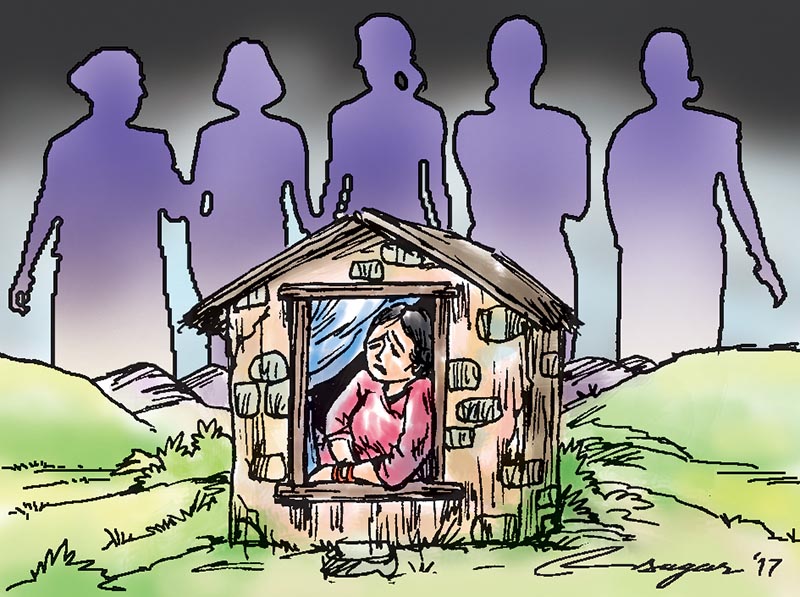Chhaupadi tradition: Uneducated belief
Most of these communities are poor with limited options for housing and no access to feminine products. A small room in a village might house a family of 5 or 6 or more people
I love Nepal and our traditions, our good traditions that bring peace and happiness lifting men and women while opposing the false ones that have endured for far too long.
In Hinduism menstruation is specified as the period of rest under “some” of the Vedas. It is considered to be a sacred and positive process which must be respected and celebrated. During this period, women face discomfort, mood swings and abdominal cramps that need special consideration and a place apart to rest. The notion of menstruation as a period of rest for women who would otherwise indulge in physically demanding work is clearly recognized in Hinduism and some restrictions historically have been aimed at serving this purpose and helping women. Sadly this is not the current view in many villages.
Vedas also state that during post-partum or menstruation a woman is unclean. Today and for more than the last hundreds of years it seems that in villages and amongst the uneducated many views have changed away from honoring womanhood to deeming a woman to be untouchable or impure during her menstruation period. What might have started out as a sacred practice to give women rest has become something else entirely under the current traditions in Western Nepal and other areas. This currently is a practice where menstruating women are banished to a shed for a period of 5-7 days during menstruation and postpartum mothers for a period of 21 days together with their newborn baby. This Chaupadi tradition, which has roots in Hindu scripture, is practiced in some communities not to give the women a rest from work but due to the uneducated belief that menstruating women can cause bad luck, crop failure, and illness in the family or other similar false beliefs. Some communities have gone so far as to forbid menstruating women to cross local bridges as they have been taught that “the river will stop flowing”. This demeaning tradition can take various forms in villages but most often means women and girls stay/sleep in unheated sheds, exposed to the elements with livestock often distant from protections of the home. They are exposed to cold, heat, poisonous snakes and animals, and in real danger of attack by strangers if they are outside the protection of the home.
Twelve years ago, in 2005, Nepal’s Supreme Court taking a step for women officially banned the practice of Chhaupadi. But without any real way to enforce the ban, the worst abuses of Chaupadi and their traditions have proved impossible to stamp out.
An additional initiative had been put in place to augment this effort of wiping out Chhaupadi by giving the law some teeth and making it a crime. The anti-Chapaudi initiative will have the local police destroy the sheds or structures used to house women during the menstruation period and follow up by making sure local families don’t rebuild them later. That’s a tactic the police have tried in the past with little apparent success after some well published deaths that occurred due to smoke inhalation and bites by venomous snakes.
On August 9, 2017 a new law was passed criminalizing the Chaupadi tradition since the previous guidelines and initiatives were not effective. Meeting with women’s circles in many villages elderly women had this to say about the practice. “We have been made to practice it and we want our daughters and daughter-in-laws to practice it too”. In these villages it is a deeply rooted religious/cultural practice where fear of offending deities is a powerful motivator. Not all women object to Chaupadi or its practices.
In fact many have embraced it. This is the battle we fight, to exchange ignorance for education. Most of these communities are poor with limited options for housing and no access to feminine products. A small room in a village might house a family of 5 or 6 or more people. Women and girls have not discovered effective solutions to manage their period where disposable pads and materials are not only expensive but totally unavailable. They feel that the only option that remains is that one their mothers had of being sent out of the home during this period to the animal shed for the well-being of others. The effect of this belief is devastating to a young girl’s self-esteem.
While passing a law can be a good thing more essential is education to eliminate these false traditions and will be more powerful, lasting, and effective than just passing a law or a temporary initiative that will likely be as ineffective as others have been before. This is not a problem that can be solved by just giving pads or materials without training in how to use them with proper hygiene either. Recently a group of good hearted people wanted to donate reusable sanitary pads to a rural community in Nepal. Since they had limited time and nobody to translate or train for them they distributed the pads without educating the women and girls on how to use them. After a few months to their surprise the hygiene kits were being used as pot holders by the village women and the liners were handkerchiefs for children. Education brings it all together and ends ignorance not charity alone.
As a medical doctor and director for Days for Girls Nepal and as a woman I stand with my sisters and volunteers in Nepal. We are clear in a vision of a bright future where women are able to be protected by the family they love and honored for bringing life. Where they don’t miss school each month or expose babies to the elements post-partum.
Wall is country director, Days for Girls Nepal






